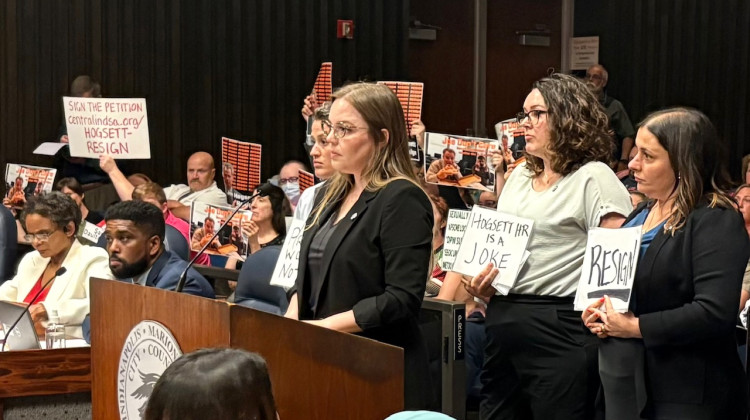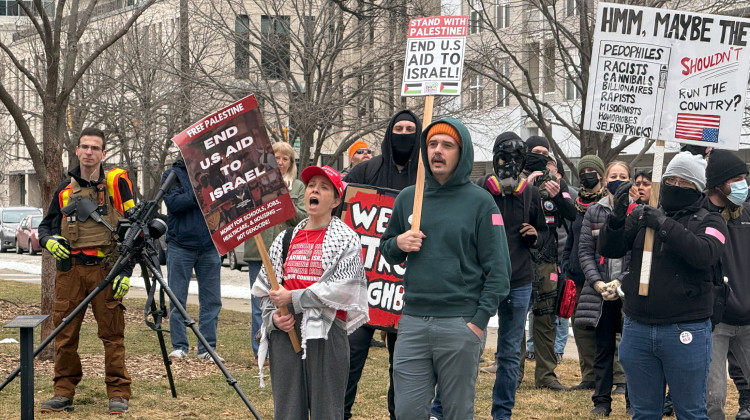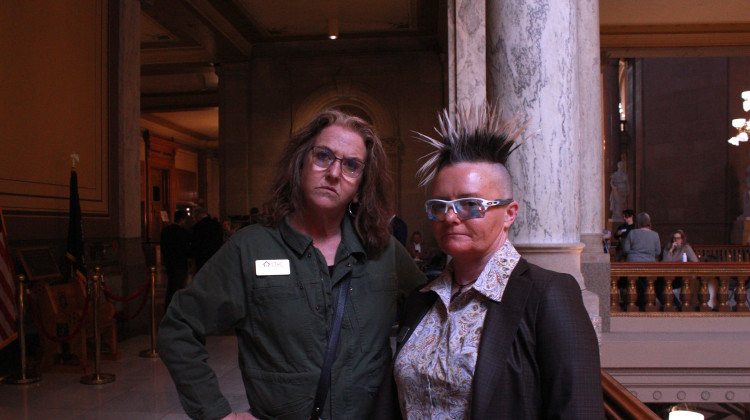
Lauren Roberts took to the podium to give testimony at a recent City-County Council meeting before she was forcibly removed.
Jill Sheridan / WFYIOn Monday night the Indianapolis City-County Council meeting erupted into chaos, as Lauren Roberts was forcibly removed from the chambers while attempting to speak about her experiences inside Mayor Hogsett's campaign. Roberts was unable to finish her statement after Council President Vop Osili cut her off for time and had her removed.
Roberts was the first woman to accuse former Hogsett chief of staff Thomas Cook of sexual harassment, resulting in an independent investigation into the response.
WFYI’s Jill Sheridan recently sat down with Roberts and former director in the Hogsett administration Morgan Mickelson Bronson, who also spoke at the meeting.
This interview has been edited for style and clarity.
Jill Sheridan: Lauren, how are you feeling? You know, I think a lot of people were really shaken by what happened at Monday's City-County Council meeting. How are you today?
Lauren Roberts: I am okay in this moment. I will say, anyone who's gone through trauma knows it's up and down, and this isn't my first rodeo. Yesterday, I felt like I got hit by a truck. Wednesday was tough. Tuesday, there's still adrenaline. I had a big panic attack, maybe the biggest ever. Thankfully, my mom was there a lot of other really scary, physical and mental things happening. So I'm not okay, but I'm okay.
Sheridan: Well, thank you for being here. And I know also when you talk publicly, that also, is another part of the trauma and the process. So I do appreciate it.
Roberts: I will say it helps, though, just being heard. That's kind of been the whole point. So, yeah,
Sheridan: To that point, you know, what was the gist of what you wanted to say on Monday night that you were unable to?
Roberts: Yeah, I'd say top line, it's that survivors have consistently not been heard. They, they being the Council, as well as the state Democratic Party, are putting out a lot of very polished statements from crisis agency, you know, PR agencies, and proposing all kinds of policy.
But as we keep saying over and over, please pause and really listen to us and let this be a survivor led, survivor centered, trauma informed process. Because, as Ayanna Pressley, the congresswoman from Massachusetts, says, the people closest to the pain are closest to the solution. And that's, I think, the tactic that counsel would be smart to take at this point.
Sheridan: So of course, all of this comes after the release of a report that dug into the sexual harassment accusations made by you and two other women. I was watching that night when the report was released to the public. You were on the phone. What was that reaction that you were having in that moment? I could tell that you were upset with what you were hearing.
Roberts: I was heartbroken. It was really devastating, because, first of all, Caroline [Ellert] and I, through our lawyer, had asked for advanced copies of the the report. I also appealed to Crista Carlino, the chairwoman of that committee, directly and she finally called me back after a couple days after I texted her and she said, 'No one's getting it early. I will ask.' And I don't know who she was going to ask, because she's in charge, but that meant that we had no idea what was coming.
We didn't know until the public was hearing it for the first time. We also were told by Crista and some others that the report would go live at 5:30 Eastern Time, online. We couldn't find it. That's why I called at first, I called on Jesse Brown's phone, which I believe he handed to counselor Nielsen, who tried to hand it to Krista. She hung up on me, and that's when my friend Elise Schrock, who was also attacked on Monday night, by the way, she held up the FaceTime and refused to put it down.
And even though I called in and was begging, not to disrupt it, or, you know, be a troublemaker, which is how they keep treating me, but to say we still don't have a copy. Like at this most basic level, this is a very poor way to treat people who have trauma. And then, of course, the report itself just has glaring omissions, very clear bias in favor of the mayor and his allies. It's very clearly misogynistic in the way it characterizes our statements as claims, the mayor's as facts. It left out the fact that the mayor himself has some bad behavior. So all around I would say it was just a mess.
Sheridan: So omissions and the relevant texts, I mean, those texts were relevant to the investigation.
Roberts: Yeah, and even if they didn't include the actual texts and documentation, because I understand there's privacy concerns, right? I actually think the committee and even Crista Carlino's intentions were probably pretty pure going in, but the way it played out, and because they wouldn't just listen to us, and because Fisher Phillips, anytime we ask questions through our lawyer, wouldn't really help and answer anything, they didn't record our conversations.
We weren't under oath. We didn't know anything about the scope. You know, they just harmed us over and over and over. And half a million dollars of taxpayer money later, I don't really know where this has gotten us, except for survivors continue to pay the price of other people's actions.
Sheridan: And so back to the meeting on Monday night. President of the City-County Council [Vop Osili] the reaction from him, after the fact, issuing, not exactly an apology, but saying, he failed you and and others... what's your reaction to this response?
Roberts: Yeah, and I'm glad you say it's not an apology, because it's being characterized that way sometimes, but in no part does he say I'm sorry. He doesn't apologize. He has my number and has for a while; we've exchanged messages. I actually texted him after the statement went out yesterday, and was like, 'You're still too scared to tell me you're sorry yourself.' Like, grow up. I've literally said that. I just don't care anymore what anyone thinks. I'm not trying to be professional or palatable.
He also has my friend Elise's number. She texted him on Monday, and she was arguably roughed up even worse than I was. A lot of a lot of people were so, yeah, I don't think it's sincere. It's clearly written by a PR agency. It came two days after what happened, and during the assault, he could have stopped it at any time.
When I listen back, I mean, I'm still kind of, obviously, I'm still traumatized from it. I'm not like in my body yet, but when I listen to recordings or watch the video, it feels like it's happening to someone else. I'm not quite identifying with it yet, and just those guttural screams, I don't understand why. That would have been enough for anyone on that dais to stand up and say, 'This needs to stop immediately.'
Sheridan: It must have been good to have people like Morgan that were next to you during this meeting, numerous people from the administration, that had worked in the administration that you know were also there to share their stories as well. Morgan, why was it so important that you were there on Monday night?
Morgan Mickelson Bronson: I just felt like it was really important to stand up for those still in the administration experiencing the workplace abuse. It's the same abuse. It may not be sexual harassment at every turn, but it is similar in that it is workplace abuse, and it is what enabled Thomas Cook to do what he did. And so I've just been speaking up since the news broke last summer, and met with pushback around every turn. And so I felt like I owed it to not only Lauren and Caroline, but to those workers still in the Hogsett administration that don't feel like they can speak up because they are afraid for retaliation.
Sheridan: And you were a leader in the administration, Director of the Office of Sustainability. What's the gist of your message? Because you also spoke, and you spoke on a number of different issues, sort of displaying how the moves that the city's making are pointless if there's not the culture to back up.
Mickelson Bronson: My message is that you know, until the toxic culture this workplace that enables the intimidation and demeaning of workers at every level, until that changes, the workers are not safe. And no amount of policy is going to fix that kind of toxic culture. You really have to root it out from the top.
Sheridan: And now we are hearing more and more stories, so I know that's part of the mission and why you're sitting here today.
Roberts: For sure, yeah, every time I speak to press or put out a social media post that talks about this stuff, and I even did a webinar that I organized recently that was totally free. It's on YouTube. It's totally public, about how to talk to the press about workplace abuse. Because ultimately, these HR processes, we know are not independent. Friends of mine have already articulated so perfectly how flawed those systems are and how broken they are, and I have found for myself that the only way to get accountability is going to the press.
The Hogsett administration and the council have only moved on any of these changes as a result of pressure of us going to the press about it. So it's important to keep doing that. It's really important for other survivors to keep being seen even if they don't identify that way or never do. But if you feel like something is wrong with the way you're being treated at work, it probably is. But conditioning and the culture that you're existing in can make you feel like you're the problem, but we are not the problem. The abusers are the problem.
Sheridan: Even larger then, looking at the state Democratic Party, Morgan, you helped pen a letter when accusations came out against minority leader Greg Taylor last year. This is what you called, a troubling pattern that we're seeing in in the party.
Mickelson Bronson: A troubling pattern of elected officials harassing their staff. Not only that, but also a troubling pattern of silence amongst our elected officials that may not be implicated but complicit in their silence all last summer. I kept asking internally when the mayor would be speaking to his own staff, when they would be speaking to the community more broadly in other ways than just a polished tweet that was ran through the office of Corporation Counsel.
And we kept waiting, and we were left waiting, and so when the news broke in December, I stopped waiting. I didn't wait for them to disappoint us, and I decided to write a letter. A couple friends helped me, and then it caught on over 70 women around the state. They wanted to put their name on that, demanding more. They're fired up.
Roberts: And these are Democratic women leaders, right? Like these are people who have influence. And I'm so tired of those of us who are the most impacted by this paying the price without any backup from the people who could really do something about it. And those are policy makers. Frankly, those are their large donors. Those are employers, and so until folks are calling for the mayor to resign and who are demanding systemic change with us, I'm kind of over hearing statements and comments; we need to see action.
Sheridan: Yes, this has been a year as well since you and Caroline came forward, and at that time policies, measures, people talking about ways that we could see change. Again, we're hearing that now, as it relates to the administration, as it relates to the release of this report, do you have any faith that these fixes will help?
Roberts: Well, first of all, it's been a year since we went on the record in the press. I've been trying to report what happened to me since 2017. The actual abuse happened in 2014 and 2015. Caroline went to the mayor, I think, at first in 2023, so this has been many years in the making. As far as the fixes, you know, I'm not an HR expert. I'm not an attorney, but I know that this process has not been survivor-led or survivor-centered.
There are many advocates out there who can advise them on this stuff, but until they actually listen to us and get an idea of what went wrong in a way that isn't through the Fisher Phillips report, which we know is incomplete and biased, I don't think these fixes are actual fixes. They they're Band-Aids. They're people trying to move on and get the narrative out of the press, and we don't want to let that happen.
Sheridan: And so Frank Mascari, councilor, offered for you to come back to an administration meeting next week when they're planning to discuss holding money back from the firm that did complete this investigation. Do you plan to speak next week?
Roberts: Absolutely not. I'm not going into that building ever again. I don't feel safe in there. I think rightfully so. I don't really feel safe being in Indianapolis anymore, which makes me very sad. A lot of people I love live here, including my family, and I think I've extended myself far beyond what is reasonable to expect out of anybody, especially a survivor. At this point, I've given them multiple opportunities to listen. They've refused to. They've had me assaulted, particularly Vop Osili.
And I hope people remember his name, because this man wants to be mayor one day, whenever that is. He currently has a city council position that's very powerful. His constituents need to be paying attention to this, because this is what kind of man that is who has a survivor of sexual assault and sexual abuse and harassment assaulted by law enforcement in the city council chambers.
Something is very wrong here, and I am not putting my body in that situation ever again. But there's plenty I've said on the record. I have lots of writing social media. They have plenty of information from me if they want to refer to it and then plenty of advocates that I've offered to put them in touch with.
Sheridan: What else would you like to say, you know, to anyone really that is listening today and is aware of the situation happening in Indianapolis?
Roberts: Yeah, tell your city council member to call for the mayor to resign. If they already have, thank them. Make sure they know that this isn't just about me or other individual cases of abuse: This is about a system that is allowing people with power to abuse those who work for them, who have less power. By the way, I'm a white, cis woman. If this assault happened to me, it would be so much worse for someone who doesn't look like me or have the background that I have.
Also, we don't want to just install a new mayor. To install a new mayor, it needs to be somebody who leads on these issues, who is interested in systemic change, who probably is going to piss off a lot of leaders in the Democratic Party. And obviously I have views on plenty of other issues, but it's clear that this mayor is abusing this entire city, whether we're talking about unhoused populations of people, undocumented folks or working families.
Things are not good here. It's not that this is a man who's good at his job and taking care of the community but just happens to be a jerk to his staff. It's abusive across the board, and he's a failed mayor. He is unfit to serve, especially now with fascism rising in our federal government and state policies here in Indiana, at least, that are harming people. Indy deserves so much better, and it's really urgent.
Sheridan: Morgan, would you like to add anything?
Mickelson Bronson: Yeah, I would echo a lot of what Lauren just said, but from my own personal experience, and I don't take this lightly, speaking about the administration in this manner. I tried to change it from within. I considered myself a proud Democrat for most of my adult life, and so it's not easy that I come forward and suggest to the councilors that it is time for call for the Mayor Joe Hogsett's resignation. I do not take it lightly, but there are ripple effects from not filling our potholes to the homelessness crisis Indianapolis. Indy deserves better.
Sheridan: Thank you, Lauren, so much for coming in.
Roberts: Thank you for having me.
Sheridan: Thank you, Morgan. So much.
Mickelson Bronson: Thank you.
 DONATE
DONATE







 Support WFYI. We can't do it without you.
Support WFYI. We can't do it without you.